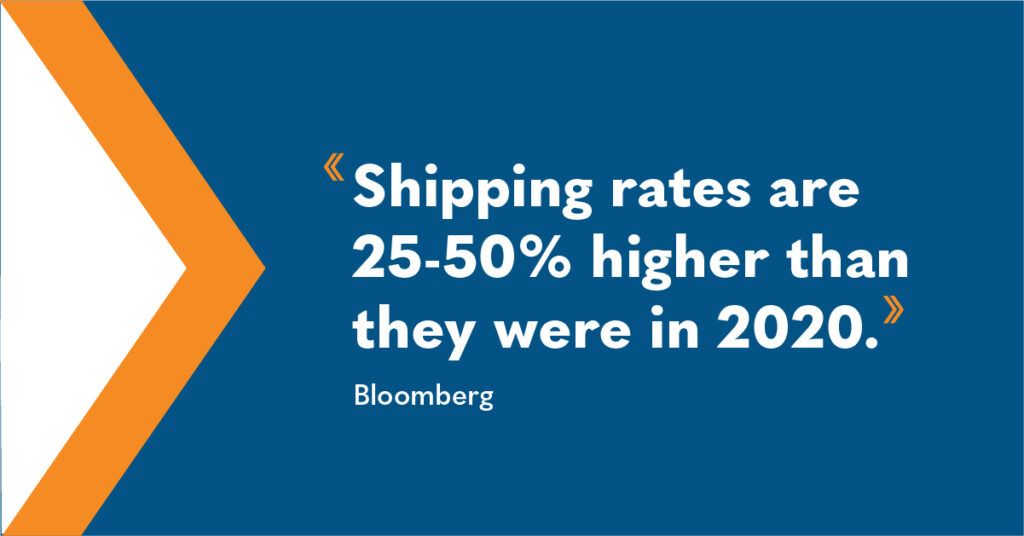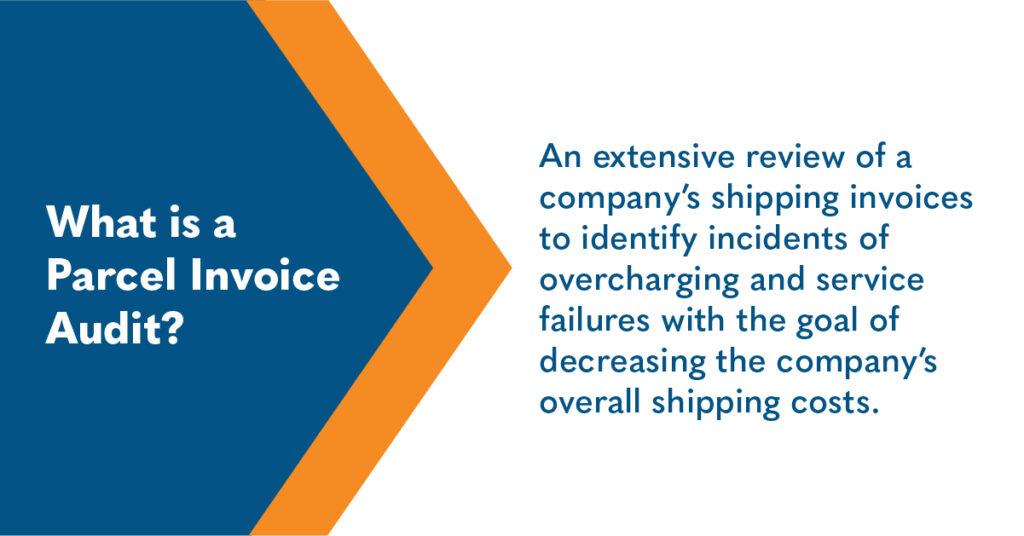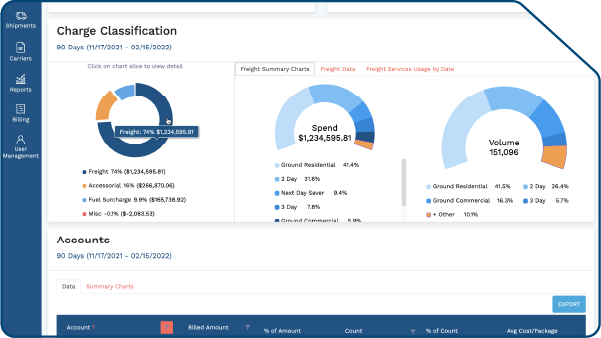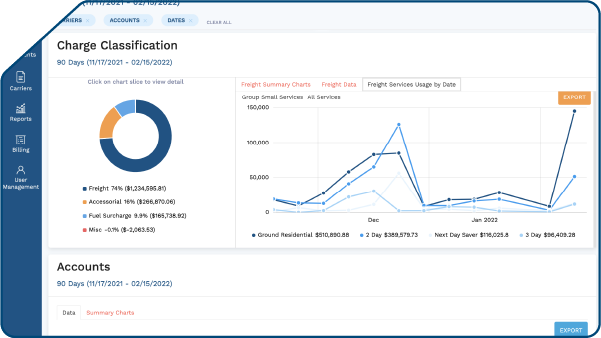Parcel Invoice AuditClaim and Credit All Eligible Refunds to Your Account
Our AI-powered platform helps UPS and FedEx shippers save big by automatically recovering, claiming, and refunding fees from late shipments, invalid surcharges, lost & damaged packages, and more.
Reduce Your Shipping Costs
Our proprietary cost modeling is built into an easy-to-use online platform that sets the industry standard for the small parcel market by providing advanced, enterprise-level solutions for all businesses.
- Fully automated invoice auditing
- 50+ audit points including late shipments, invalid surcharges, and lost/damaged packages
- Contract Compliance
- Automatically identify, submit, and verify claims
- Reduce the cost of every shipment
- Instant savings
What is a Parcel Invoice Audit?
Save Big with our Parcel Invoice Audit
Our audit platform automatically identifies, submits, and verifies claims on your behalf.
No upfront costs. No risk.
Freight and Parcel Invoice Audit

Conducting a thorough parcel or freight audit gives you the ability to discover discrepancies in your invoices and catch other costly errors made by your carrier. In this article, we wanted to give you an in-depth overview of freight and parcel invoice auditing and discuss how you can use the data uncovered from the audit to lower your overall shipping costs.
The truth is, if everyone has the best shipping rates, then no one has the best shipping rates.
Let’s get started.
What Is the Difference Between Parcel and Freight?
In the simplest of terms, parcel audits specifically focus on boxes that are shipped to multiple locations and labeled individually, while freight audits focus on a collection of boxes shipped in one go. Parcels are often referred to as packages, although both terms can be used interchangeably. Parcel shipping has dimensional requirements as well, if a package is over 108 inches by 165 inches, then small parcel shipping companies will categorize those packages as freight.
Freight shipping is dedicated to large quantities of boxes or cargo that are sent as a unit to the same location via truck, cargo plane, ship, or train. Freight cargo loads are placed on pallets and are categorized by the amount of space they take up in the shipping container. There are three freight load categories:
- Full truckloads
- Less than truckloads (LTL)
- Partial truckload shipments
Although parcel and freight are different, the audit processes for both are fundamentally the same.
What is a Freight Invoice Audit? What are Parcel Audits?

Why is a Freight or Parcel Audit Important?
Types of Freight Audit and Parcel Audit
Third-Party Parcel Auditing Service
A good freight and logistics consulting partner, like Parcel Advantage, possesses the automated technology, data processing and experience needed to analyze and organize your carrier invoices into manageable reports that elaborate on key performance indicators. These actionable shipping insights and analytics allow you to better understand where your money is going and empower you to make more informed decisions regarding your carrier choices. Additionally, Parcel Advantage will file for the claims and refunds systematically and have them applied directly against future invoices. In short, we’ll handle the data analytics while you focus on what you do best, creating and selling your products.
Questions to Ask Before Choosing A Third-Party Freight/Parcel Auditing Service:
- What specific insights will I gain from your analysis of my shipping data?
- How long have you been operating in the market?
- How do you process information that is entered manually by carriers?
- How much, on average, do you save your partners?
- How is your technology structured? What makes it better than other systems?
- What is your customer service process?
- Is all of the data gathered in one system?
- What additional tools do you provide?
- Can you handle our projected growth and scale up, if necessary?
ParcelAdvantage’s Actionable Data Insights: Audit Data You Can Trust
Our unique parcel auditing service allows us to review and analyze your parcel invoices and compile extensive data insights into your shipping costs and processes.
The expedited process opens the door for more refunds and decreases in our overall shipping costs. We’re armed with real time parcel invoice and live freight data which allow us to better analyze and optimize your shipping methods to keep you one step ahead of your competition. Using our AI-driven technology and knowledge of the shipping industry, we are able to:
- Analyze customer parcel or freight invoices for invalid or irregular charges.
- Audit parcel or freight invoices by interpreting and applying carrier rate provisions and customer contracts.
- Provide monthly reports to customers showing all valid charges as well as recovered credits.
- Track carrier compliance and monitor service interruptions.
What are the 7 Objectives in the Audit Process?
In our parcel auditing processes we use our AI technology to sift through mountains of shipping data – all charges, refunds, and carrier credits are cataloged and analyzed for errors or violations. Here are our top 7 objectives of auditing:
- Identify late deliveries: The shipment was delivered past its set delivery date.
- Catch lost or damaged shipments: You were billed for a shipment, but the goods were lost or damaged.
- Identify incorrect charges: You were hit with a residential delivery surcharge, but it is actually a commercial address.
- Find duplicate charges: A shipment was billed multiple times.
- Catch incorrect address corrections: The carrier charges fees for an address correction that was not necessary or was initially correct.
- Find faulty dimensional weight charges: The carrier used the wrong dimensions.
- Identify incorrect rates: The carrier failed to apply a discount listed in your agreement.

Invoice Audit Checklist
To give you some more information, we created this helpful checklist to break down each step of our Parcel Advantage auditing process.
- Collect your invoices. To begin your audit process, we need to access your carrier invoices.
- Organize your expenses into categories. After you have given us access to your invoices we will then begin to separate them by category. Typically, our system would group them by the carrier and sort the invoices from newest to oldest. This helps us get a more accurate and holistic picture of your invoice data.
- Identify your benchmarks. After our system has logged and organized all of your invoices, we begin to analyze the data. Our system establishes benchmarks throughout this process to correctly identify where your money is going and how it is being used.
- Analyze the data. This is when our system evaluates the data to see where the mistakes are happening and how much they are costing your business. During our fully automated data analysis process, there are various data points our system reviews to ensure that you are being charged appropriately and that your shipping carrier is as efficient as possible. This information we collect not only saves you money but also helps inform your future decision-making. Some factors we take into consideration include:
- Wrong Addresses – This remains one of the most common shipping mistakes. If your shipping carrier sends your goods to the wrong destination, then this can result in costly and time-consuming efforts to track down shipments. An audit reveals instances where this happens and how often.
- Unnecessary Increases In Pricing – You don’t need us to tell you that shipping prices can increase dramatically at a moment’s notice – especially when the price of fuel increases. Although some of these price increases are unavoidable, an audit can reveal exactly where the money is going and help you identify ways to minimize spending even when you are faced with volatile price hikes.
- Review your rate. After going through all of the potential errors in your invoices and analyzing the data, our system logs all of your charges and determines if you are being billed the correct amount.

Tips for Negotiating Contracts with Carriers After Your Audit
We know your carrier representative has told you that you have the best rates, but if significant errors are discovered during the auditing process you will need to negotiate. You can’t negotiate the best rates without specialized insight into your specific costs – which is exactly what Parcel Advantage offers. We use your own data plus our technology to arm you with the information you need to cut down your shipping costs.
Our superior technology isn’t the only thing working in our favor when it comes to providing advice for negotiating with shipping carriers. Our team is made up of experts from the shipping and logistics world – some of us used to negotiate for shipping carriers themselves. The point is, your experience combined with our insights into your data and support from our team will ensure that you get the shipping rates you deserve.
Things To Keep In Mind During Negotiations After Your Audit
Conduct thorough research
Be prepared to compromise
Honesty and transparency are key
Lack of transparency is detrimental to all negotiations, for all involved parties. Having accurate data to back up your claims during negotiations is paramount when it comes to transparency. Your audit data fosters transparency on two levels:
- Reveal instances in which your carrier has not been honest or transparent with you.
- Proves that your claims are valid, and substantiates your requests throughout negotiations.
Your carrier needs to have a comprehensive understanding of where you stand and what your needs are. If your carrier is reluctant to accept the data you are presenting then that is a sign that you may want to limit further dealings with them in the future.
Properly assess the risks and liabilities
Only seek out and maintain mutually beneficial partnerships.
Save More With ParcelAdvantage’s Intelligent Audit Services
At Parcel Advantage, our mission is simple. We’re here to save you money. Using your own data with our technology, we offer detailed and specialized insight into your specific shipping costs. We take your raw invoice data and layer on the cost of the carrier to service your account as opposed to benchmarking – this allows us to see all of the data that is outside of your view. We’re not better negotiators; we’re just backed by data driven benchmarks that allows us to insure you achieve best in class rates. We know what the carriers are willing to do to earn your business. Its our job to make sure you get everything you have earned!

Additional Resources
- Carrier Contract Negotiation
- FedEx Surcharges
- Parcel Audit Services
- Parcel Audit Software
- Parcel Invoice Audit
- Shipping Audit
- Shipping Insights & Analytics
- Shipping Optimization
- Small Parcel Audit
- UPS Surcharges
Subscribe To Our Blog
Reduce Your Shipping Costs
Our proprietary cost modeling is built into an easy-to-use online platform that sets the industry standard for the small parcel market by providing advanced, enterprise-level solutions for all businesses.